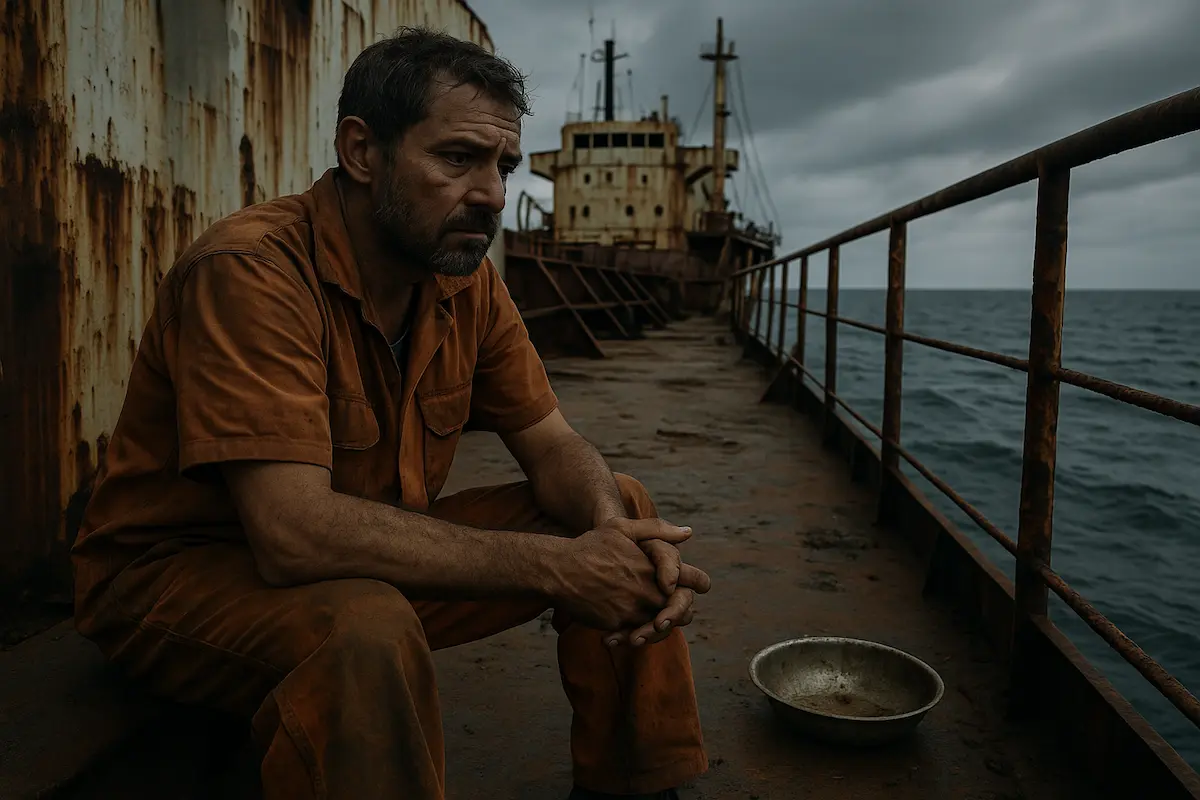
How does it feel forgotten .. ?? Not only is it overlooked, but really, regularly deserted ..
In the middle of the ship that is slowly collapsed on the left side, watching the lack of food and hope passes every day.
For many sailors in 2025, this is not a distant hypothesis, but their everyday reality.
The latest figures published by the International Federation of Transport Workers (ITF) depicts a severe image of a growing crisis at sea. Only in the first half of the year 2025, ITF recorded a 30 % increase in sailing by 2024.
222 amazing ships, and more than 286 sailors, officially registered as deserted, with no salary wages of more than $ 13 million.
ITF Inspector Coordinator Steve Trowsdale did not retreat in his evaluation. “Every item of stigmatization is,“She said ..”This is a deliberate abuse of human rights.“.. ..
This is not a random neglect .. This is a deliberate exploitation.
Who is responsible for this travesty .. ??
One of the most warning patterns is where this happens.
Europe is not too far behind, with 34 % of cases, many ships related to the so -called “convenience flags”, a good interpretation of the jurisdiction with loose regulations and even relaxing.
Now pause here for a moment .. Think about it, “Flag of Convenience” .. This term is betraying the problem .. Who comfort for whom ?. ?? Certainly, for sailors left inside the plane, it is often not fuel, food, or even the ability to call.
Almost 75 % deserted ships Below are the convenience flags, such as St. Kitts and Novo, Tanzania and Comoros. These registrations provide anonymousness and minimum supervision and allow ship owners to refuse to liability during the strike.
ITF warns that this parasitic system enables exploitation and weakens international work standards.
Disposal adds to the subjects that bother the sailors
This crisis in isolation is not obvious. Abandoning is the only most famous symptoms of a broader disease that continues to undermine the social contract with its workers.
We have reported on other worrying trends in sailing welfare over the past year. The beach leave, for example, is once considered a basic right to relax and relieve mental relief, becoming a concept at risk.
A prominent report released earlier this year by marine trust in cooperation with the World Maritime University showed that more than a quarter of sailors receive no coastal leave during their contracts, which usually lasts about 6.6 months.
Even when a beach leave is awarded, it is often limited to a few hours of hurry on the beach, and sometimes it is so expensive that many do not even know that they are worth pursuing.
One of the sailors revealed it completely. “After a long sailing, we feel tired. Our beach leave is right, but now, ports have found ways to deny it or impose heavy costs. It’s like they don’t want us to use the ship.“.. ..
Then there is a crime issue.
Sailors and areas of conflict
When we are on the ground, if there is a conflict or strike, etc., it is easy for us to simply move away or go another path.
But sailors are sometimes dispatched to active conflict areas without evaluating proper risk or classification of performance such as war and in some cases, contrary to their demands, and destroy their safety and dignity.
David Heindel, head of the ITF Seafarers department, calls for these areas, especially areas such as the Hormoz Strait and parts of the Red Sea that will be formally determined as areas of war operations.
He argues that at least this ensures that sailors have the right to risk their sailing without the risk of their livelihoods, and also consider them to be suitable for compensation and evacuation protocols.
To combine issues, some sailors are still operating with expired or extensive certificates due to the backwardness of the epidemic.
Why are ship owners allowed to move away?
In the face of all this, ITF is increasing.
ITF believes that part of the response is not a significant implementation of specific flag countries and port countries. “The rogue ship owners know they can abandon ships in places like the UAE and Türkiye and face any consequences“Trowsdale said ..”There are legal and institutional mechanisms to prevent leaving in the Maritime Convention, but they are only effective if used.“.. ..
And this is the most important issue. The world has regulations, treaties and marine codes.
The way forward or more than the same .. ??
So what’s going on now? Is this just another cycle in the naval news agency, will soon be replaced with the next crisis? Or do industry, governments, ship owners, charter, ports, eventually confront the uncomfortable truth that sailors are sacrificed for operational convenience?
In transportation and transportation sources, we believe that this moment should be a turning point.
If we want to restore trust and dignity in transportation, then we have to start protecting those who all do so .. not tomorrow .. not in another report .. now ..